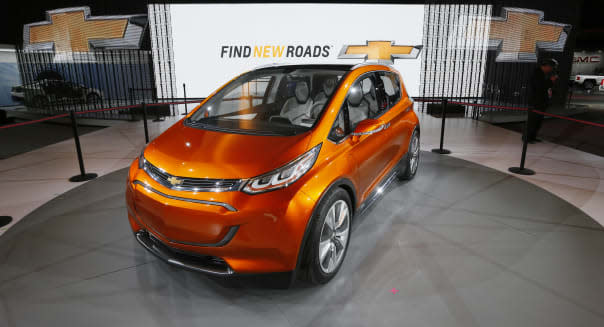More Electric Cars Are Coming, but Will You Want to Buy One?

"Electric cars are the future," investors have been saying, as they snap up shares of companies such as Tesla Motors (TSLA).
But consumers are saying something different, something more like, "We're not ready for that kind of future."
President Obama once hoped to see a million electric cars on American roads by 2015. But even though sales have been growing, the total isn't yet anywhere near that.
That isn't stopping the automakers from gearing up to bring more and more electric cars to market. But at a time when gas costs less than $3 a gallon, will anyone want to buy them?
New Electric Cars Still Have Disadvantages
There are a slew of new electric cars headed for market. General Motors (GM) promises that its upcoming new Chevy Bolt sedan will get about 200 miles of range at a price around $30,000. The Bolt is expected to go into production late next year.
%VIRTUAL-WSSCourseInline-947%Not to be outdone, Nissan is hinting that the next generation of its all-electric Leaf -- the best-selling electric car so far -- will have similar range at a similar price. It's expected to arrive at dealers at around the same time as the Bolt, late next year or early in 2017.
Upscale entries are coming, too. Tesla is planning to roll out its long-awaited Model X SUV late this year. It'll face competition from a new electric Audi SUV -- and possibly, in a few years, an all-electric Porsche sedan as well.
But one automaker noticeably absent from the rush to battery-electric cars is Toyota (TM). You'd think that the company that has sold more hybrids than anyone would be out in front of the next wave of green-car technology. But it's not.
Toyota thinks that the time it takes to recharge an electric car will end up turning off most consumers. It's pursuing a different technology: fuel cells, which chemically extract energy from hydrogen to make electricity. Toyota's new fuel cell car, the Mirai, can be refueled in just five minutes -- if there's a hydrogen station handy.
Toyota Is Skeptical for Good Reason
At almost $70,000, the Toyota Mirai is expensive, and Toyota is only planning to build it in tiny numbers at first.
But Toyota's concerns about battery-electric cars resonate with many car buyers. Electric cars are a hard sell, especially when gas is cheap -- and when automakers are still getting good improvements in fuel economy from their gasoline engines.
Analysts at InsideEVs.com estimate that Americans bought 119,710 plug-in vehicles in 2014. That category includes fully electric cars as well as "plug-in" hybrids, and it's an estimate because Tesla only reports total global sales, not U.S. sales.
That total represents a 23 percent increase from 2013, InsideEVs says. That's promising for fans of electric cars. But it's still just a tiny fraction -- 0.7 percent, to be precise -- of the over 16 million cars, pickups, and SUVs sold in the U.S. last year.
It's easy to understand why most car-shoppers are still shying away from electrics. Electric cars come with an unfamiliar set of hassles. They need to spend hours charging, and -- aside from the expensive Teslas -- they don't have anything like the range of a car powered by a gasoline engine. And they're still very expensive for what you get, more so than gasoline cars, although prices are coming down.
Electric Cars Don't Make Sense for Most Buyers Yet
Car buyers concerned about fuel economy -- but unwilling to deal with the high cost and hassles of an electric car -- are still better served by looking at hybrids. They offer some of the advantages of electric cars, but they're much easier to live with. If you want to try plugging in your car and cruising on electric power, but don't want to make the full leap to an electric, a "plug-in" hybrid like the Chevy Volt or Ford's (F) Fusion Energi sedan might be worth a look.
But the cost and inconvenience of fully electric cars explains why most automakers are continuing to bet big on hybrids, even while they dabble in electric cars. For consumers, owning a hybrid is a lot like owning a regular gas-powered car -- you'll just visit the gas station less often.
There may come a day when electric cars make sense for more car shoppers. That's the biggest reason that companies such as GM and Nissan continue to work on them. But unless something big changes in the next few years, the car of the near future is still likely to need gas from time to time.
Motley Fool contributor John Rosevear owns shares of Ford and General Motors. The Motley Fool recommends Ford, General Motors, and Tesla Motors. The Motley Fool owns shares of Ford and Tesla Motors. Try any of our Foolish newsletter services free for 30 days. Check out our free report on one great stock to buy for 2015 and beyond.

